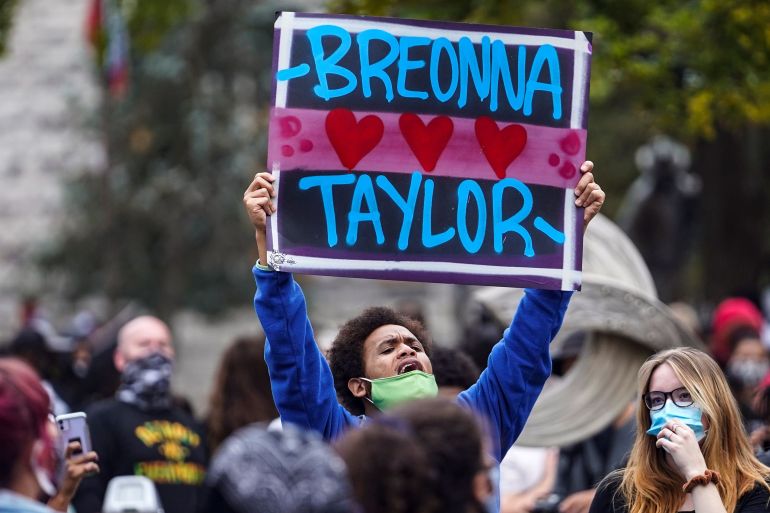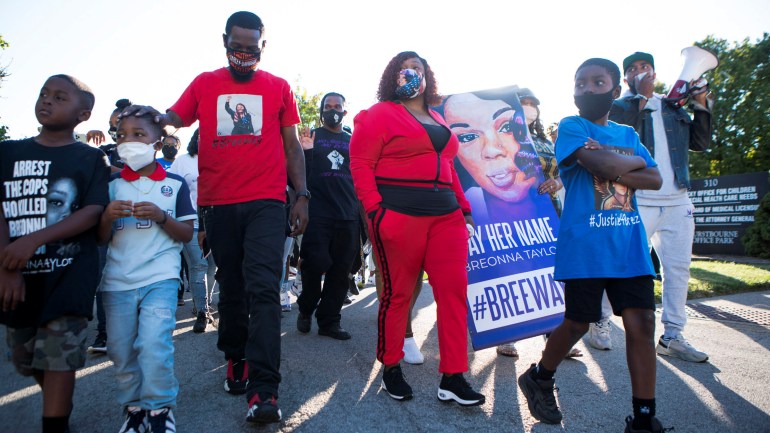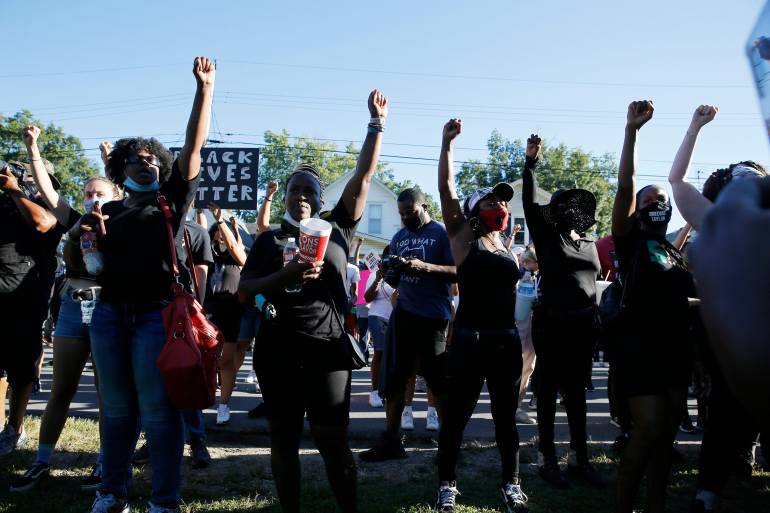Breonna Taylor: A timeline of events
For two months, Breonna Taylor’s killing at the hands of police went largely unnoticed until George Floyd died after a police officer knelt on his neck for nearly nine minutes.

Black Lives Matter protests were held in a number of United States cities, in the wake of the announcement by the Kentucky state attorney general on Wednesday that police officers would not be charged in the shooting death of Breonna Taylor.
Taylor, an unarmed Black woman was shot five times by Louisville police serving a narcotics warrant at her home. She had been sleeping, and bled to death in her hallway. The officers did not render aid.
Keep reading
list of 4 itemsFormer US police officer sentenced in killing of Black man Elijah McClain
US paramedics found guilty in 2019 death of Black man Elijah McClain
Angela Davis: ‘Palestine is a moral litmus test for the world’
Here is a timeline of events that began with Taylor’s death – a killing by police in her home in Kentucky has encouraged a national reckoning on race:
March 13: Officers serving a narcotics warrant fatally shoot Taylor in her home in Louisville, Kentucky.
March 13, hours later: Police announce the arrest of Kenneth Walker in the wounding of an officer during an exchange of gunfire; Taylor is left unidentified at the news conference, described as “an unresponsive woman who was later pronounced dead”.
March, April: The shooting stays out of the headlines as the COVID-19 pandemic spreads in the United States.
April 27, Taylor’s family files a wrongful death lawsuit against the police department and city, challenging the police narrative.
May 13: Top Louisville prosecutor Tom Wine recuses himself from reviewing police investigation, Attorney General Daniel Cameron is named as the special prosecutor.

May 20: Chelsey Napper, Zayden Flournoy and Cody Etherton sue Officers Brett Hankison, Myles Cosgrove and Jonathan Mattingly, accusing them of disregarding human life by spraying gunfire into Napper’s apartment, next door to Taylor’s.
May 22: Prosecutors announce they will drop attempted murder charges against Walker, who shot at officers in his girlfriend’s home.
May 28: Walker’s anguished 911 call is released, three days after the death of George Floyd at the hands of police in Minnesota, sparking large protests in Louisville.
May 29: Mayor Greg Fischer suspends the use of no-knock warrants by Louisville police.
June 1: Fischer fires Police Chief Steve Conrad after officers failed to turn on body cameras in the shooting of barbecue cook David McAtee during protests in Louisville.
June 11: Louisville Metro Council unanimously passes the “Breonna’s Law” which bans the use of no-knock warrants.
June 14: Popstar Beyonce writes to Attorney General Daniel Cameron, urging him to charge the police officers.
June 23: Officer Brett Hankison, one of three officers who fired shots on the night of Taylor’s death, is fired for “blindly” firing into Taylor’s apartment.

June 25: Celebrities join hundreds of demonstrators outside state Capitol calling on Cameron to charge officers.
June 28: Photographer Tyler Gerth is fatally shot at the site of continuing protests in downtown Louisville.
July 14: Protesters are arrested for demonstrating on Cameron’s front lawn.
August 12: Taylor’s mother, Tamika Palmer, meets Cameron.
September 1: Breonna Taylor’s boyfriend, Kenneth “Kenny” Walker, files a lawsuit which claims he is a victim of police misconduct and asks for immunity for firing a bullet which wounded a police officer during the raid which killed Taylor.
September 5: Hundreds peacefully protest outside Kentucky Derby, urging Cameron to criminally charge the officers.
September 7: Fischer names Yvette Gentry, the first Black woman to lead Louisville Police department, as interim chief beginning October 1.
September 9: Cameron is included on President Donald Trump’s shortlist of Supreme Court candidates.
September 15: City announces civil settlement providing Taylor’s family with $12m and promising police reforms.
September 22: Louisville police set up blockades downtown in anticipation of Cameron’s announcement.
September 23: A Kentucky grand jury indicted Hankison for shooting into neighbouring apartments, but did not charge any officers for their role in Taylor’s death.
September 23-24: Grand jury ruling sparks demonstrations in Louisville and a number of other cities around the US.